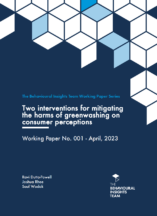Abstract
Growing demand for environmentally friendly products has led to an increase in companies exaggerating their environmental credentials, a practice commonly referred to as “greenwashing.” To identify the impact of greenwashing, and to test potential interventions, we designed an online experiment featuring a series of three advertisements featuring hypothetical companies. A representative sample of 2,352 participants were randomised into a control group or one of two intervention groups. Intervention groups saw either a literacy or prebunking intervention, both designed to enable participants to identify common greenwashing strategies. We find that greenwashing is effective: participants were significantly more likely to agree that fictional companies in greenwashed ads had higher green credentials compared to companies depicted in non-greenwashed ads. This effect was most pronounced for those with higher levels of self-reported environmental concern. We also find that our interventions reduce the impact of greenwashing: participants in both intervention groups rated the green credentials of companies with greenwashed ads significantly lower than participants in the control group. This effect appears to be driven partly by increasing general scepticism of the green credentials of firms, and partly by increasing scepticism specifically towards greenwashed claims.
JEL codes: M37, Q40
Keywords: Greenwashing, misinformation, green advertising, perceived greenwashing






